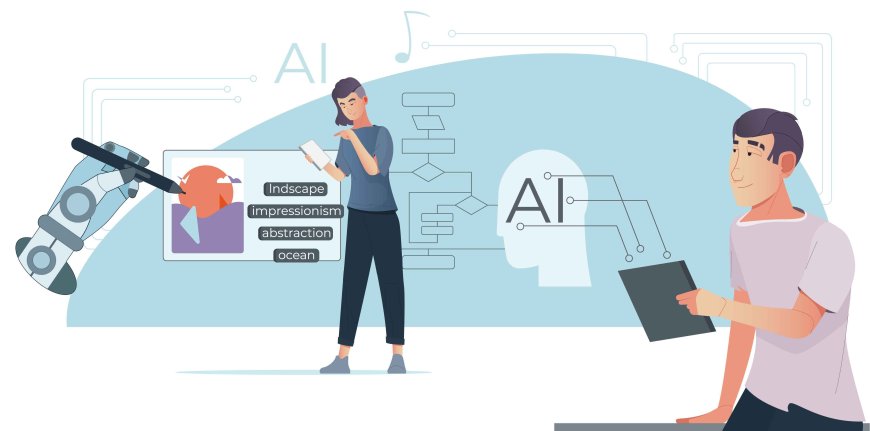Why Businesses Are Investing in Custom AI Development Services In 2025
Custom AI development is the process of building artificial intelligence systems especially suited to a business’s unique objectives, workflows, and goals.

Introduction to Custom AI Development
In 2025, artificial intelligence is not just influencing businesses—it's transforming them from the inside out. Whether it's optimizing operations, enhancing customer experiences, or making smarter decisions faster, AI is a core part of modern enterprise strategy.
What Is Custom AI Development?
Custom AI development is the process of building artificial intelligence systems especially suited to a business’s unique objectives, workflows, and goals. Custom AI is created from the ground up utilizing private data, industry-specific algorithms, and interaction with current corporate infrastructure, in contrast to pre-built AI solutions, which provide general functionality and no customization.
What does this genuinely mean for businesses in 2025, then? It indicates that they are no longer depending on universally applicable technologies. Instead, they're developing intelligent systems that are strategically aligned with their brand, goals, and operational needs. This may include tailored recommendation engines for e-commerce platforms, predictive analytics tools for logistics companies, or smart assistants trained to respond to specific customer support concerns.
The customization process typically begins with identifying the problem you want to solve—this could be increasing customer retention, automating repetitive tasks, improving product recommendations, or analyzing large volumes of data. From there, developers select the appropriate machine learning models, feed them business-specific data, and fine-tune the outputs based on feedback and KPIs.
Another major aspect of custom AI is integration. Your AI system should talk to your CRM, ERP, HR software, and more, pulling insights and offering suggestions in real-time. That’s something off-the-shelf tools rarely do seamlessly. With custom AI, you’re building a digital brain for your business—something that understands how you operate and supports every decision with actionable insights.
In 2025, as companies face increasingly competitive and data-driven markets, the demand for these kinds of specialized, flexible, and powerful AI systems is exploding. Businesses are no longer experimenting with AI—they’re relying on it to scale smarter, faster, and more efficiently than ever before.
The Rise of AI in Business Operations
Over the past decade, artificial intelligence has evolved from a buzzword to a fundamental pillar of digital transformation. In 2025, it’s clear: AI is not just an accessory; it’s a necessity for modern business operations. From customer service chatbots and sales forecasting models to robotic process automation and intelligent analytics platforms, AI is embedded in almost every facet of enterprise functionality.
So, what’s behind this meteoric rise? Simply put, AI brings unmatched speed, accuracy, and adaptability to business processes. It can sift through terabytes of data in seconds, uncover patterns invisible to the human eye, and make recommendations that lead to better decisions—whether that’s in marketing, finance, HR, or logistics.
Businesses are increasingly using AI to manage repetitive and time-consuming operations. This increases efficiency while simultaneously allowing human employees to focus on strategic, creative, or high-value tasks. For example, AI can handle 80% of a customer's requests using natural language processing, leaving complicated issues to human agents.
Every click, swipe, purchase, and interaction generates valuable insights—if you can analyze them fast enough. AI does that. And when customized, it can do it exactly the way your business needs it to.
Additionally, AI supports predictive capabilities. Want to know which product will trend next quarter? How many customers are likely to churn? When will your inventory hit a critical low? AI models can forecast it all, letting businesses plan smarter and avoid costly mistakes.
AI is also enabling a shift from reactive to proactive operations. Instead of waiting for problems to arise, businesses can predict and prevent them. For instance, in manufacturing, AI can flag machinery that’s likely to fail before it happens, reducing downtime and saving thousands in repairs.
As we progress into a hyper-connected, high-speed digital economy, companies that don’t adopt AI risk falling behind. The real game-changer, though, is custom AI—designed not just to automate but to optimize everything you do.
Market Trends Driving AI Adoption
Global AI Spending Forecast for 2025
The artificial intelligence business has grown at an exponential rate in recent years, and all indications suggest that 2025 will be a record-breaking year. IDC and Gartner predict that global AI spending would surpass $500 billion by the year's end, up from about $300 billion in 2023.
That's not just an increase; it's a revolution.
There is more to this investment boom than meets the eye. It is motivated by measurable ROI. Companies in a variety of industries are seeing the benefits of AI, whether it is an accelerated time to market, lower operating expenses, or more customer happiness. Now, instead of asking whether to invest in AI, executives want to know how much, how quickly, and how customized it can be.
A significant portion of this spending is going into custom AI development. Enterprises are realizing that generic AI solutions often fall short when dealing with industry-specific challenges. That’s why they’re partnering with AI development firms to build tools that address unique pain points, provide deeper insights, and deliver results faster.
Cloud AI services also continue to dominate the investment landscape. However, in 2025, we’re seeing a rise in hybrid and on-premise custom AI solutions, especially among businesses prioritizing data sovereignty and security. Sectors like healthcare, finance, and government are leading the charge here, ensuring compliance while still leveraging advanced AI technologies.
Startups and mid-sized businesses are not left out either. As AI tools, frameworks, and open-source libraries become more accessible, even smaller firms are joining the fray. Many companies begin with MVPs (Minimum Viable Products), then scale their own AI solutions as they expand.
There is no denying that companies everywhere are viewing AI as a long-term investment rather than a passing fad. Those that develop AI to match their business, not the other way around, will emerge victorious in 2025.
Industries Leading the AI Revolution
While nearly every industry is exploring AI, some are blazing the trail in 2025 with game-changing custom solutions. Let’s break down who’s leading the pack and why:
1. Healthcare
AI is transforming diagnostics, patient care, and drug discovery. Custom AI tools are being developed to analyze medical imaging, predict disease outbreaks, and even assist in robotic surgeries. Hospitals are using AI to personalize treatment plans based on genetic data, while health tech startups are building custom apps to monitor chronic conditions in real time.
2. Finance
Banks and financial institutions are using AI to detect fraud, automate compliance, and personalize banking experiences. Custom AI platforms are being developed to perform real-time risk assessment, manage investment portfolios, and forecast market trends. This not only reduces risk but also creates more personalized services for clients.
3. E-commerce and Retail
AI helps retailers analyze buying patterns, predict trends, and personalize the shopping journey. Custom recommendation engines, dynamic pricing tools, and AI-powered inventory management systems are driving higher conversion rates and customer retention.
4. Manufacturing and Logistics
Custom AI is optimizing supply chains, improving quality control, and enhancing predictive maintenance. From smart factories to automated warehouses, AI helps manufacturers reduce costs and improve uptime.
5. Marketing and Advertising
Marketers are using AI to segment audiences, automate content creation, and optimize ad spend. Custom AI tools enable precise targeting, real-time campaign adjustments, and performance analysis that drives better ROI.
6. Legal and Education
AI is helping legal professionals sift through massive documents, perform contract analysis, and predict case outcomes. In education, custom AI is being used to create personalized learning experiences and assess student progress in real-time.
Across the board, these industries are demonstrating that AI isn’t just a tech upgrade—it’s a strategic asset. And custom development is the key to unlocking its full potential.
Benefits of Custom AI Solutions for Businesses
Enhanced Operational Efficiency
One of the most immediate and measurable benefits of custom AI solutions is the significant boost to operational efficiency. In 2025, businesses are navigating an increasingly competitive landscape where speed, accuracy, and agility are essential to staying ahead. Custom AI tools allow companies to automate routine processes, optimize resource allocation, and eliminate redundancies—all tailored specifically to how that business operates.
For example, in manufacturing, a custom AI system might monitor equipment performance in real time and predict failures before they occur. This kind of predictive maintenance can reduce downtime by up to 40%, saving companies both time and money. In customer service, AI-driven bots can handle thousands of inquiries simultaneously with personalized responses, ensuring customers get the help they need instantly, 24/7.
Unlike off-the-shelf tools that offer generic functionality, custom AI adapts to your specific workflows. Let’s say your business processes invoices in a unique way, or your supply chain has non-standard variables—custom AI can be trained to handle these idiosyncrasies without missing a beat.
These efficiencies aren’t just operational—they’re strategic. When your team spends less time on repetitive tasks, they can focus on innovation, strategy, and customer engagement. Imagine freeing up 30% of your employees' time—what would that mean for your company’s growth potential?
Moreover, with real-time data processing and intelligent analytics, decision-makers have access to the insights they need without delay. Dashboards powered by AI can visualize trends, flag anomalies, and recommend next steps, making your business more proactive than reactive.
In short, custom AI transforms your business into a well-oiled machine—streamlined, scalable, and smart. And in a world that’s moving faster than ever, that kind of efficiency isn’t just a bonus; it’s essential for survival.
Personalized Customer Experiences
In the age of personalization, customers expect experiences that are tailored to their preferences, behaviors, and needs. Gone are the days when a generic marketing message or a one-size-fits-all product could capture attention. In 2025, businesses are using custom AI development solutions to create deeply personalized customer journeys that foster loyalty, satisfaction, and conversions.
Custom AI leverages a company’s proprietary data—user behavior, purchase history, interaction patterns—to create unique profiles for each customer. This data feeds into algorithms that can make incredibly accurate predictions about what a customer might want next. Whether it’s product recommendations, dynamic pricing, or personalized emails, every touchpoint becomes an opportunity to delight and convert.
For example, an online retailer might use a custom recommendation engine that adjusts in real time based on browsing behavior, seasonality, and inventory. A streaming platform could tailor content suggestions not just based on viewing history, but mood indicators from previous interactions. In hospitality, hotels are using AI to personalize guest experiences—from room preferences to curated travel itineraries.
Unlike generic AI tools, custom-built systems take into account the nuances of your brand and audience. You control the tone, the logic, and the outcomes, ensuring the AI behaves in a way that’s consistent with your customer experience goals. This level of granularity is crucial in today’s market, where customers are more discerning and brand loyalty is harder to earn.
Personalized AI also extends to customer service. Intelligent virtual assistants can greet users by name, remember past issues, and offer solutions without escalating to a human agent. It’s fast, efficient, and feels genuinely human.
The result? Higher engagement, better conversion rates, and stronger brand loyalty. In 2025, businesses that master personalization through custom AI aren’t just meeting expectations—they’re setting the standard for what a modern customer experience should look like.
Cost Savings and ROI Potential
Investing in custom AI development may seem expensive upfront, but the long-term returns can be game-changing. In 2025, companies are realizing that the real question isn’t “Can we afford to build custom AI?”—it’s “Can we afford not to?”
First, let’s talk about cost savings. Custom AI eliminates inefficiencies by automating time-consuming tasks, optimizing resource use, and reducing human error. Whether it’s processing thousands of invoices, managing inventory, or scheduling deliveries, custom AI handles it faster and with fewer mistakes than manual processes ever could.
Take the example of a logistics company using AI to optimize delivery routes. A custom-built algorithm, tailored to the company’s geographic coverage and fleet capabilities, can reduce fuel consumption and delivery times, cutting operational costs by up to 25%. That’s not just saving money; it’s increasing customer satisfaction by ensuring timely deliveries.
On the ROI side, the numbers speak volumes. Companies using custom AI report significant returns through enhanced customer lifetime value, increased sales conversions, and reduced churn. A personalized AI recommendation system might boost average order value by 15–30%. Predictive maintenance tools can prevent costly breakdowns and production halts. These are quantifiable improvements that directly impact the bottom line.
Moreover, with custom AI, you own the intellectual property. That means no recurring licensing fees or usage limits common with third-party platforms. Over time, this drastically reduces your total cost of ownership. Plus, you can continuously refine the model to improve outcomes as your business grows.
It’s also worth mentioning the intangible ROI, like improved employee satisfaction from offloading tedious tasks, or better decision-making powered by real-time insights. These soft benefits contribute to a healthier, more innovative organization.
In a competitive market, custom AI isn’t just a cost-saving tool—it’s a profit-generating engine. The smartest businesses in 2025 are building now to reap the rewards for years to come.
Use Cases of Custom AI in Different Sectors
AI in Healthcare
The healthcare industry has embraced AI with open arms—and for good reason. Custom AI solutions are making a profound impact on how medical data is analyzed, diagnoses are made, and patients are treated. In 2025, custom AI is not just improving healthcare—it’s revolutionizing it.
One of the most significant use cases is in diagnostic imaging. AI algorithms trained on thousands of X-rays, MRIs, and CT scans can now detect abnormalities with incredible accuracy, sometimes surpassing human radiologists. Custom-built models are particularly valuable because they can be trained on localized datasets, considering demographics, genetics, and regional health patterns.
In predictive analytics, hospitals are using AI to forecast patient admissions, identify those at risk of chronic conditions, and even anticipate potential complications before surgery. These insights help allocate resources more effectively, reduce readmission rates, and improve patient outcomes.
Telemedicine platforms are also integrating custom AI to offer real-time symptom checks, automate follow-up schedules, and triage patients efficiently. Personalized care plans can be generated based on individual health records, lifestyle data, and wearable devices, creating a holistic, continuous care model.
Moreover, in pharmaceuticals, custom AI is being used for drug discovery and clinical trials. Models can identify promising compounds, simulate drug interactions, and optimize trial participant selection, cutting years and millions off development cycles.
Privacy is paramount in healthcare, which makes custom solutions even more critical. Custom AI can be deployed on secure, local servers with built-in compliance for HIPAA, GDPR, and other regulations—something generic tools often can’t guarantee.
In essence, AI in healthcare isn’t just about automation—it’s about better care. And with custom development, healthcare providers can ensure their AI tools are as unique and precise as the patients they serve.
AI in Finance
The financial sector is among the most data-intensive industries, making it a prime candidate for custom AI development. In 2025, financial institutions are turning to tailor-made AI systems to strengthen security, streamline operations, and offer hyper-personalized services that enhance client trust and engagement.
One of the most prominent use cases is fraud detection. Financial fraud is becoming more sophisticated, but so are the tools designed to prevent it. Custom AI algorithms can analyze spending patterns in real time and detect anomalies that indicate fraudulent activity. Unlike off-the-shelf fraud solutions, a custom model is trained on your institution’s specific data, making it far more accurate and context-aware.
Risk assessment is another area where custom AI excels. Traditional credit scoring systems rely on rigid formulas, but custom AI can incorporate a wider variety of factors, like transaction history, social signals, or behavioral trends, to make smarter, more inclusive lending decisions. This not only reduces defaults but also opens access to credit for underserved populations.
In algorithmic trading, AI models predict market trends and execute trades at lightning speed. A custom-built trading bot can be fine-tuned to a firm's investment strategies and risk tolerance, outperforming general-purpose platforms by significant margins.
Customer service in finance is also being transformed. Virtual assistants powered by AI can help clients check balances, dispute charges, or apply for loans—all through a seamless, intuitive interface. These bots are trained on financial lingo, compliance rules, and the specific policies of each institution, making them incredibly reliable.
Finally, compliance and regulatory reporting—typically tedious and time-consuming—are now being automated using AI. Custom solutions ensure that these processes align precisely with changing regulations and internal policy guidelines.
With financial markets becoming more complex and competitive, custom AI solutions offer agility, security, and deep insights, making them indispensable for banks, insurance companies, and fintech startups alike.
AI in E-commerce
E-commerce is one of the most dynamic industries on the planet, and in 2025, it’s thriving thanks to custom AI solutions that revolutionize how online retailers attract, engage, and retain customers. From intelligent product recommendations to dynamic pricing and virtual shopping assistants, AI is driving the next wave of digital shopping experiences.
One of the biggest AI game-changers in e-commerce is personalization. Using customer data like browsing history, past purchases, and even social media interactions, custom AI algorithms can recommend products with uncanny accuracy. These aren’t cookie-cutter recommendations either—they’re finely tuned to reflect individual tastes, preferences, and even shopping moods.
Inventory management is another area where custom AI proves invaluable. AI can analyze sales trends, seasonal demand, supplier timelines, and more to predict stock levels with precision. This minimizes stockouts and overstock situations, leading to leaner operations and happier customers.
In customer support, AI-driven chatbots are replacing traditional help desks. But these aren’t generic bots—they’re trained on the company’s FAQs, product manuals, and customer interactions. They can help track orders, suggest alternatives, and resolve issues without escalating to human agents unless necessary.
Another powerful use of custom AI is in dynamic pricing. AI models adjust prices in real time based on demand, competitor pricing, inventory levels, and customer segments. This maximizes margins while staying competitive.
AI also enhances visual search capabilities. Shoppers can upload an image, and AI can instantly identify and suggest similar products available on the platform. This kind of intuitive feature not only improves the user experience but also drives conversions.
Lastly, AI-powered analytics dashboards provide e-commerce managers with deep insights into what’s working and what’s not. These tools help optimize campaigns, product listings, and user flows with data-driven decisions that were previously unimaginable.
Simply put, in the e-commerce world of 2025, custom AI is the ultimate growth engine, turning insights into action and browsers into buyers.
Why Off-the-Shelf AI Isn’t Enough
Limitations of Pre-built AI Tools
Off-the-shelf AI tools might seem like a convenient solution at first, especially for small businesses just dipping their toes into artificial intelligence. They’re widely available, relatively affordable, and often promise quick setup. However, these pre-packaged solutions come with several limitations that can restrict a company’s potential for innovation and efficiency. One of the primary drawbacks is that they are designed with a general audience in mind. They are not tailored to the unique processes, goals, or challenges specific to your business.
These tools often offer limited customization, which means you’re stuck working around the AI rather than it working for you. Imagine buying a suit off the rack and trying to fit it to a unique body type—it rarely fits perfectly without alterations. The same applies to pre-built AI: it lacks the deep integration and contextual understanding that a custom-built solution provides.
Moreover, pre-built AI systems might not adapt well to changes in your business model, scale appropriately as your company grows, or handle complex data inputs unique to your industry. This lack of flexibility often forces businesses to either switch platforms frequently or invest in expensive workarounds. Additionally, proprietary constraints on data usage, model training, or third-party integration can further stifle innovation and adaptability.
Another significant issue is data security and compliance. Many pre-built AI services are cloud-based, with data processing occurring off-site. For industries like healthcare or finance, where data privacy and regulatory compliance are crucial, this can be a huge red flag. In contrast, custom AI solutions can be built with privacy by design and housed within your organization’s secure infrastructure.
Ultimately, businesses looking for a strategic edge need AI tools that evolve with them, not tools that restrict them. That’s why more companies in 2025 are moving away from generic, one-size-fits-all solutions and toward tailored AI systems that align with their strategic goals.
Flexibility and Scalability of Custom AI
Custom AI development services offer a level of flexibility and scalability that off-the-shelf solutions simply cannot match. When you build an AI solution from the ground up, you have full control over every aspect—from the data it learns from to the way it integrates with your existing systems. This allows you to create an intelligent system that truly understands your business logic, workflow, and KPIs.
Scalability is another critical benefit. As your business grows, your AI needs will evolve. With a custom solution, you can continuously refine, retrain, and scale your model to meet new demands. Whether you’re adding new services, entering new markets, or dealing with higher volumes of customer interactions, your AI can grow with you.
Think of it as designing a building with expansion in mind—you plan the foundation to handle additional floors, new rooms, or even an entire wing. Custom AI works the same way. It allows for modular updates, API integrations, and cloud-native deployment, so your solution never becomes obsolete.
Custom AI also enables deep integration across departments. For example, marketing, sales, customer support, and product development can all leverage the same AI ecosystem, fine-tuned to serve each department’s unique needs. This unified intelligence layer increases collaboration, data sharing, and overall business alignment.
Finally, custom AI fosters innovation. With control over the architecture and algorithms, you can experiment with cutting-edge technologies such as federated learning, reinforcement learning, or multimodal AI. You’re no longer bound by the constraints of a third-party provider. This freedom fuels creativity and enables you to stay ahead of the curve in a highly competitive landscape.
In short, custom AI isn’t just a tool—it’s a strategic investment in the future. It empowers you to innovate, scale, and adapt on your own terms, which is exactly why forward-thinking businesses are doubling down on custom AI development in 2025.
The Role of AI in Business Strategy for 2025
AI as a Competitive Advantage
In the modern digital economy, artificial intelligence is no longer a luxury—it’s a necessity. And not just for automating tasks or analyzing data, but as a key driver of strategic advantage. Businesses in 2025 are increasingly recognizing AI as a catalyst for innovation, decision-making, and long-term sustainability.
Custom AI development plays a vital role in this evolution. It allows organizations to fine-tune their operations in ways that are aligned with their core values, customer expectations, and market trends. For instance, companies can use AI-driven insights to identify gaps in their supply chain, forecast consumer demand with near-perfect accuracy, or personalize product offerings at scale. This kind of precision was unthinkable a decade ago.
Moreover, AI enhances agility. Businesses that can pivot quickly based on real-time insights are more likely to survive market disruptions. In a world where change is the only constant—whether it's due to economic shifts, regulatory updates, or customer behavior—AI equips leaders with the tools to make faster, smarter decisions.
Custom AI also plays a central role in risk management and compliance. From predictive maintenance in manufacturing to fraud detection in banking, AI can help mitigate operational risks before they become costly issues. By integrating AI into core business functions, companies can stay proactive rather than reactive.
Ultimately, AI is shaping not just how businesses operate but how they think. The shift is from intuition-based decisions to data-driven strategy, from isolated departments to interconnected ecosystems. In this landscape, the companies that harness the power of custom AI are the ones setting the pace for the future.
Key Technologies Powering Custom AI in 2025
Natural Language Processing (NLP)
Natural Language Processing (NLP) has rapidly evolved into one of the most transformative elements of artificial intelligence. In 2025, businesses are leaning heavily into NLP to redefine how they interact with customers, manage data, and improve communication internally and externally. Custom AI solutions built with advanced NLP capabilities allow organizations to unlock the value hidden in textual data—emails, chat logs, social media posts, surveys, and even documents.
Unlike traditional NLP tools that offer limited language understanding, custom-developed NLP models can be fine-tuned with industry-specific datasets, dialects, and customer interactions. This level of customization enables far superior performance when it comes to sentiment analysis, intent recognition, and semantic search. For instance, a legal firm can train an NLP model to analyze contracts with precise legal context, or a retail business can use it to understand customer feedback at scale and in real time.
Moreover, multilingual NLP is becoming increasingly crucial for global companies. A custom solution allows for localized language models that understand cultural nuances and provide personalized responses, breaking language barriers effortlessly. In sectors like customer support and content moderation, this can significantly reduce resolution time and enhance user satisfaction.
Conversational AI, powered by NLP, is another booming trend. Custom chatbots and voice assistants are helping businesses offer 24/7 support, automate repetitive queries, and reduce human workload without compromising the customer experience. These bots aren’t just scripted responders—they’re context-aware, emotionally intelligent, and continuously improving through user interactions.
In short, NLP is giving businesses a new superpower—the ability to “listen” at scale and “speak” with clarity. Custom NLP development ensures this superpower is tailored exactly to a business’s needs, making it a cornerstone of intelligent automation in 2025.
Machine Learning and Deep Learning Algorithms
At the heart of every powerful AI system lies a well-designed machine learning (ML) or deep learning (DL) algorithm. While many out-of-the-box AI solutions rely on generic models, custom AI development focuses on building these algorithms from scratch or adapting them to a company’s unique challenges. This approach ensures maximum performance, accuracy, and relevance.
Machine learning algorithms excel at identifying patterns in data and making predictions based on that information. In 2025, businesses are applying ML to a wide range of applications—from sales forecasting and dynamic pricing to fraud detection and recommendation engines. The secret sauce of custom AI is that these models are trained on proprietary data sets, which are often richer and more relevant than generic public datasets.
Deep learning, on the other hand, mimics the human brain’s neural networks. It’s particularly powerful in handling unstructured data such as images, video, and audio. For example, custom DL models are used in autonomous vehicles for object detection, in manufacturing for visual defect inspection, and in security systems for facial recognition. The possibilities are almost endless.
Customizing ML and DL models gives businesses control over key parameters such as accuracy, bias mitigation, and processing speed. You can choose which features to emphasize, optimize performance for specific hardware, and ensure the model’s outputs align with business goals. You’re not relying on a black box—you’re building a transparent, accountable system.
Another benefit? Continuous learning. With custom AI, models can be updated regularly with new data, ensuring they evolve with market conditions and business growth. This keeps your AI system sharp, relevant, and ahead of the competition.
In summary, ML and DL aren’t just about predictions—they’re about precision, power, and progress. Custom AI development leverages these technologies to give businesses a smarter, more adaptive edge.
How Businesses Are Building Custom AI Solutions
The Custom AI Development Process
Building a custom AI solution is not an overnight job. It’s a strategic journey that starts with understanding business problems and ends with deploying a highly functional, intelligent system. In 2025, businesses are approaching AI development with greater sophistication, using agile methodologies and cross-functional teams to ensure success.
The first step is problem identification. Companies must define what they want the AI to solve—be it reducing churn, optimizing supply chains, or automating customer interactions. This phase involves stakeholders from across the organization to align the AI’s goals with the overall business objectives.
Data preparation and collecting follow, which is perhaps one of the most important yet time-consuming processes. AI depends on data to function, and the higher the quality of the data, the better the model performs. Companies use sensors, ERPs, CRM systems, and even external APIs to collect pertinent data. Then follows data cleaning, standardization, and labeling, particularly for supervised learning models.
Once the data is ready, engineers will proceed to model selection and training. Selecting the appropriate algorithm, training it on the provided data, and assessing its performance using various metrics such as accuracy, precision, recall, and F1 score are all part of this process. GPU-powered cloud environments are frequently utilized to accelerate deep learning applications' training processes.
Then comes integration and deployment. The model is wrapped into a user-friendly application, connected to existing systems via APIs, and made accessible through web or mobile platforms. Businesses often use CI/CD pipelines for seamless updates and version control.
Post-deployment, the focus shifts to monitoring and optimization. AI models aren’t static—they need regular updates to maintain performance. Businesses track KPIs, gather feedback, and refine the system continuously.
By taking this structured approach, businesses ensure that custom AI development is not just a tech project but a value-adding business initiative.
Challenges in Custom AI Development
Data Privacy and Security Concerns
In the age of data-driven decisions, ensuring the privacy and security of that data is more important than ever. As more companies move toward custom AI development in 2025, they're also confronting the increasing complexity of data privacy regulations and cybersecurity threats. While AI systems are only as good as the data they’re trained on, managing that data responsibly has become a critical business priority.
One of the major challenges is compliance with international regulations. Laws like the EU’s GDPR, California’s CCPA, and newer data protection acts across Asia and Latin America have forced businesses to rethink how they collect, store, and process data. Custom AI solutions need to be designed with these laws in mind, incorporating privacy-by-design principles from the ground up. This includes techniques like data anonymization, encryption, and secure access protocols.
Moreover, as AI systems ingest large volumes of sensitive information—customer identities, financial records, healthcare histories—they become targets for cybercriminals. A poorly secured AI model could serve as a backdoor into a company’s digital infrastructure. That’s why businesses investing in custom AI are also ramping up their cybersecurity strategies, implementing multi-factor authentication, regular audits, and endpoint protection tools.
Another concern is internal misuse. Not all threats come from hackers. Employees misusing or mishandling AI-generated data can lead to breaches or compliance violations. Businesses are now emphasizing AI governance frameworks, training staff on ethical AI usage, and defining clear policies for data access.
The stakes are high. A data breach doesn’t just lead to fines—it can damage a brand’s reputation and erode customer trust. Therefore, in 2025, any custom AI development worth its salt includes a robust security and privacy layer. It’s no longer optional—it’s mission-critical.
High Development Costs and Time Investment
Custom AI development is a powerful investment—but it’s not a cheap one. One of the most common challenges that businesses face when going the custom route is the high upfront cost and significant time required to build, test, and deploy these systems. Unlike plug-and-play solutions, which you can launch in a day, custom AI is a marathon, not a sprint.
Costs begin to accumulate from the initial planning phase—hiring AI engineers, data scientists, and domain experts doesn’t come cheap. There’s also a need for specialized tools and platforms to process massive datasets and train models efficiently. Depending on the complexity of the solution, businesses may need to invest in cloud infrastructure, data lakes, and advanced computing hardware like GPUs or TPUs.
Then there’s the time factor. It can take months to complete a fully functional AI system that’s ready for real-world deployment. From data preparation to model tuning and testing, every stage is meticulous and iterative. Delays in data availability, scope creep, or integration issues with legacy systems can push timelines even further.
But here’s the truth: while custom AI development demands time and money, it also delivers long-term value that off-the-shelf tools can’t. Businesses must evaluate ROI over the long haul. A system designed specifically for your company’s workflow will eventually reduce operational costs, increase productivity, and drive innovation in ways that generic tools cannot.
Many companies are also finding creative ways to manage costs, partnering with AI development firms, using open-source frameworks, or applying for government innovation grants. In 2025, the mindset is shifting. AI is no longer seen as a cost center; it's viewed as a strategic asset that pays off when done right.
Future Outlook for Custom AI Development
AI and the Next Wave of Digital Transformation
Custom AI is at the heart of what’s being called the second wave of digital transformation. The first wave—marked by cloud computing, mobile apps, and big data—paved the way for automation and remote accessibility. The second wave, led by artificial intelligence, promises something even more powerful: self-improving systems that can learn, adapt, and optimize themselves.
In 2025, businesses aren’t just digitizing operations—they’re “intelligent-izing” them. AI is transforming every department. Marketing teams use predictive analytics to launch better campaigns. HR uses AI for smart recruitment. Finance teams leverage AI to catch fraud before it happens. Operations are becoming leaner, smarter, and faster.
The adoption of custom AI will accelerate even more as tools become more accessible and frameworks more robust. Open-source libraries like TensorFlow, PyTorch, and Hugging Face are making it easier for businesses to build and scale custom solutions. Meanwhile, advancements in edge AI and federated learning are solving issues around latency and privacy, making AI deployment more efficient and secure.
We’re also seeing the rise of AI-as-a-Service (AIaaS), where companies can outsource certain components of AI development, speeding up the build process and reducing costs. However, custom AI will always have the edge when it comes to depth, integration, and competitive differentiation.
What does this mean for businesses? Those who invest in custom AI now will not only survive the digital future—they’ll shape it. They’ll be the companies defining new standards in customer experience, innovation, and operational excellence.
Conclusion
The development of custom AI is now a competitive advantage, not a sci-fi idea. By 2025, companies in a variety of sectors will have realized that off-the-shelf AI solutions just cannot match the accuracy, adaptability, and long-term value that tailored systems provide. From enhancing operations and cutting costs to driving personalized customer experiences and navigating complex data environments, custom AI is the fuel powering the next generation of digital transformation.
It's not always an easy journey. There are hurdles, including data security issues, expensive development costs, and complicated integration needs. However, the reward is huge. With the correct plan, partners, and long-term goals, any company can use bespoke AI to achieve new heights of productivity and creativity.
Those who create the future will own it. Custom AI development is the template for that future in 2025.
FAQs
1. Why should a business invest in custom AI instead of using pre-built tools?
Custom AI offers greater flexibility, scalability, and alignment with specific business needs. Unlike generic solutions, it integrates deeply with workflows, enhances data security, and evolves with your goals.
2. What industries benefit most from custom AI development in 2025?
Industries such as healthcare, finance, retail, logistics, and manufacturing are leading adopters due to their complex data requirements and the need for tailored intelligence solutions.
3. How long does it take to develop a custom AI solution?
The timeline can vary from a few months to over a year, depending on the complexity of the project, data availability, and integration needs.
4. Is custom AI development affordable for small businesses?
While it can be costly, small businesses can start with MVPs (Minimum Viable Products), open-source tools, or AIaaS models to manage costs and scale over time.
5. What are the risks involved in custom AI development?
Key risks include data privacy issues, project delays, budget overruns, and the challenge of maintaining and updating the system. These can be mitigated with proper planning and experienced development partners.








































































